The Writing Life of: David Litwack
David Litwack
This week on ‘The Writing Life of:‘ I am thrilled to be interviewing author David Litwack. David will be sharing with us detail of his writing life, telling us all about his latest book ‘The Children of Darkness‘, which was released on 22nd June 2015 and answering a few fun questions too. Post contains affiliate links.
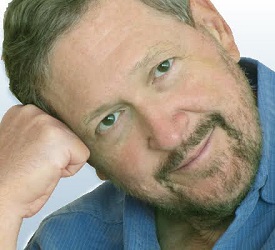
The urge to write first struck when working on a newsletter at a youth encampment in the woods of northern Maine. It may have been the night when lightning flashed at sunset followed by northern lights rippling after dark. Or maybe it was the newsletter’s editor, a girl with eyes the color of the ocean. But he was inspired to write about the blurry line between reality and the fantastic.
Using two fingers and lots of white-out, he religiously typed five pages a day throughout college and well into his twenties. Then life intervened. He paused to raise two sons and pursue a career, in the process becoming a well-known entrepreneur in the software industry, founding several successful companies. When he found time again to daydream, the urge to write returned.
There Comes a Prophet is his first novel in this new stage of life.
David and his wife split their time between Cape Cod, Florida and anywhere else that catches their fancy. He no longer limits himself to five pages a day and is thankful every keystroke for the invention of the word processor.
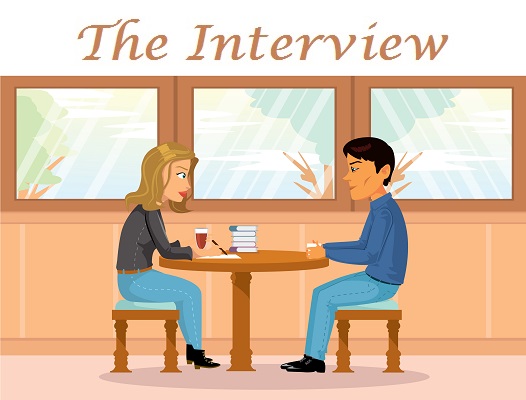
1) Do you remember the moment you decided that you would like to become a writer?
The urge to write first struck me at age sixteen when working on a newsletter at a youth encampment in the woods of northern Maine.
It may have been the wild night when lightning flashed at sunset followed by the northern lights rippling after dark. Or maybe it was the newsletter’s editor, a girl with eyes the color of the ocean. The next day, I had a column published under my byline, and I was hooked.
2) How did you go about following your dream?
I started writing when I was sixteen and took writing courses in college. Throughout my twenties, I religiously wrote five pages a day, until career and family intervened, Then I basically gave up, frustrated with my lack of progress.
Thirty years later, with career done and family grown, I had no intention of writing again. But once I had time to daydream again, the ideas started to flow. That’s why I call myself “the once and future writer.”
3) Is there a particular author that inspires you?
There are so many I love that have influenced my writing. I have always read cross genre. When I became an avid reader in my teens, I devoured fantasy and science fiction, but also literary fiction.
I loved the works of Arthur C. Clarke, Isaac Asimov, and of course, Tolkien, but also of Hemingway and Steinbeck.
If you forced me to name a book I wish I wrote, I think it would be a composite of Clarke’s The City and the Stars and Hemingway’s For Whom the Bell Tolls—a story beautifully written, with a fantastic alternate world, lofty themes, and intense characters who believe passionately in their cause.
4) What is your average writing day like? Do you have any strange writing habits?
I aim for two sessions a day of two hours each, but it varies with the stage of a novel.
First drafts are hard, and I might go days without writing, and then get inspired and do three sessions in a day. Editing is different. I’ll sometimes edit ten hours a day, especially in later drafts and when a deadline is looming.
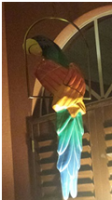
Our house in Florida came with a furnished office where I do my writing. While I was at first not enamored with the Caribbean décor (lots of parrots), I felt better after touring Ernest Hemingway’s home in Key West, the site where he wrote some of my favorite books.
This picture is of the giant parrot that sits on a brass swing in my office above the desk. Since our trip to Key West, I’ve given him the nickname Ernest.
5) Do you write Longhand, Type writer, Computer?
In my youth, I used a typewriter, carbon paper and white-out (for those who remember). Thank goodness, never again. With my constant need to revise and my poor typing skills, it’s the word processor for me.
6) From all your books, do you have a favourite character?
I used to say that my favorite was Kailani from "The Daughter of the Sea and the Sky".
She’s so mysterious, but at the same time wise, naïve and vulnerable. But now that I’m nearly done with the Seekers series, I think I’d say Orah.
She’s smart and passionate in her beliefs, and a natural leader but one who always doubts herself and questions her decisions—a trait that would be a good thing in some of our real world leaders.
7) Do you plot your books completely before hand or do you let your imagination flow whilst in the writing process?
I usually conceive of a new book as a series of images and scenes, daydreaming about them while I finish work on the prior novel.
I maintain a notes file for the new novel and do a rough draft of these scenes—a very rough draft, what some people call “scaffolding” or “riff writing” like improvisation in jazz. The file can get pretty chaotic. Every now and then I make a feeble attempt to organize it (when I’m finishing up a novel, I try to avoid distractions and stay focused on getting it out to the publisher).
By the time I’m ready to start the new novel, I usually have about 20,000 words of loosely connected prose—20-25% of the eventual novel but probably 80% of its essence. I take a couple of months to read, edit and organize that file into a dense plot outline. Then I start a new file from scratch, cutting and pasting prose as appropriate.
It’s a messy process in the early going, but unlike those who start with a more organized outline, I need that amount of writing to get to know the characters and live in the story.
Concerning your latest book:
The Seekers Book One
Author – David Litwack
Publisher – Evolved Publishing
Release Date – 22nd June 2015
Format – ebook, paperback, audio

“But what are we without dreams?”
A thousand years ago the Darkness came—a terrible time of violence, fear, and social collapse when technology ran rampant. But the vicars of the Temple of Light brought peace, ushering in an era of blessed simplicity.
For ten centuries they have kept the madness at bay with “temple magic,” and by eliminating forever the rush of progress that nearly caused the destruction of everything.
Childhood friends, Orah and Nathaniel, have always lived in the tiny village of Little Pond, longing for more from life but unwilling to challenge the rigid status quo.
When their friend Thomas returns from the Temple after his “teaching”—the secret coming-of-age ritual that binds young men and women eternally to the Light—they barely recognize the broken and brooding young man the boy has become. Then when Orah is summoned as well, Nathaniel follows in a foolhardy attempt to save her.
In the prisons of Temple City, they discover a terrible secret that launches the three on a journey to find the forbidden keep, placing their lives in jeopardy, for a truth from the past awaits that threatens the foundation of the Temple. If they reveal that truth, they might once again release the potential of their people.
Yet they would also incur the Temple’s wrath as it is written: “If there comes among you a prophet saying, ‘Let us return to the darkness,’ you shall stone him, because he has sought to thrust you away from the Light.”
8) How long did it take to get from the ideas stage, to the date of publication?
The Seeker series started out as a standalone novel called "There Comes a Prophet".
The initial idea came to me about eight years ago, and it was published in 2011. After producing two other novels, I decided at the urging of readers to go back and turn this standalone dystopian story into a trilogy. Prophet became The Children of Darkness(with a changed title, cover and publisher) and I’ve just published the second book, The Stuff of Stars.
I’m hard at work on the third and final offering, to be called "The Light of Reason".
9) Did you suffer from writer’s block at any stage? How did you overcome it?
I sometimes think writer’s block is just another way of saying that writing a novel is really hard.
I try to keep writing, even if I think it’s going poorly. Then I see how it looks the next day. I remind myself that I can always revise or just throw it away. Nothing’s worse than staring at a blank page.
Long walks are another good way to get the creative juices going. Whatever the case, I try to avoid just sitting there and staring at the screen. Write, read or go for a walk.
10) How did you come up with the name(s)for your lead character(s)?
Names matter, especially for a SciFi/Fantasy writer building new worlds.
The names need to be consistent and reflect that culture. For the Seekers trilogy, where the people have been forcibly returned to something like our 15th century, I found the passenger manifest for the Mayflower, and borrowed names, mixing up first and last names to get ones like Nathaniel Rush or Thomas Bradford. All except for Orah.
I wanted her to be different, a rebellious throwback to an earlier time. So rather than picking from the Anglo-Saxon, I chose a name with Hebrew roots. As an added subtlety, the name Orah means light.
11) If your book was made in to a film, who would you love to play the lead character(s)?
Not sure.
12) Did you get anyone in particular to read your work before sending it to the publisher i.e family member, friend etc?
My wife reads everything I write once I get to a middling draft. In addition, for a number of years I belonged to a writing group. Then the final line of defense is an independent editor.
www.davidlitwack.com
@DavidLitwack
Goodreads
I would like to say a big thank you to David Litwack for sharing with us details of her writing life, and for a wonderful interview.

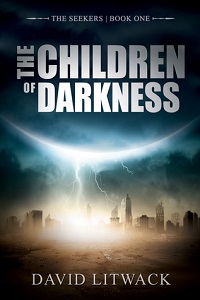
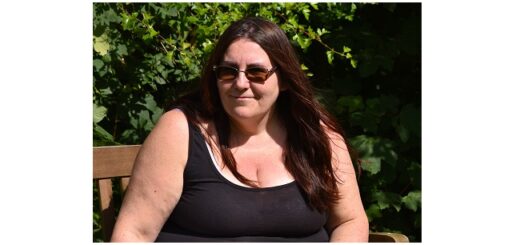
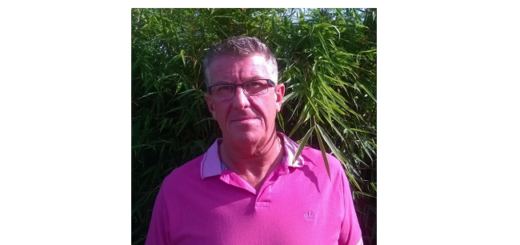
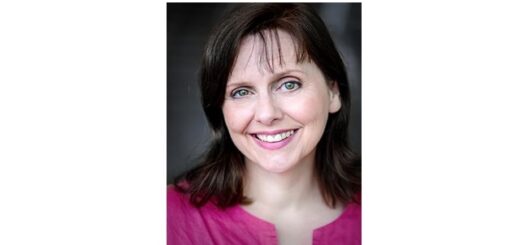
I noticed a number of similarities between David’s and my background. Both us us started writing at a relatively young age, working on newsletters, punching typewriter keys (thank Heaven for computers, word processors, and spell checkers!), and writing habits. I’ll have to check out his books to see how his writing style and mine compare.
Nice job on the presentation, Stacey!
Thanks Ross. I like to see how different writers came to be doing the job they love.
I love the sound of your writing process David. It’s very similar to what I have done, and am planning to do again shortly. I’m resisting the urge to open the book crammed with post-its that I’ve been scribbling random thoughts on for a while but I know I’m going to end up writing in chunks and then piecing it together – it’s messy.
Many thanks Georgia for you comments on David’s interview.